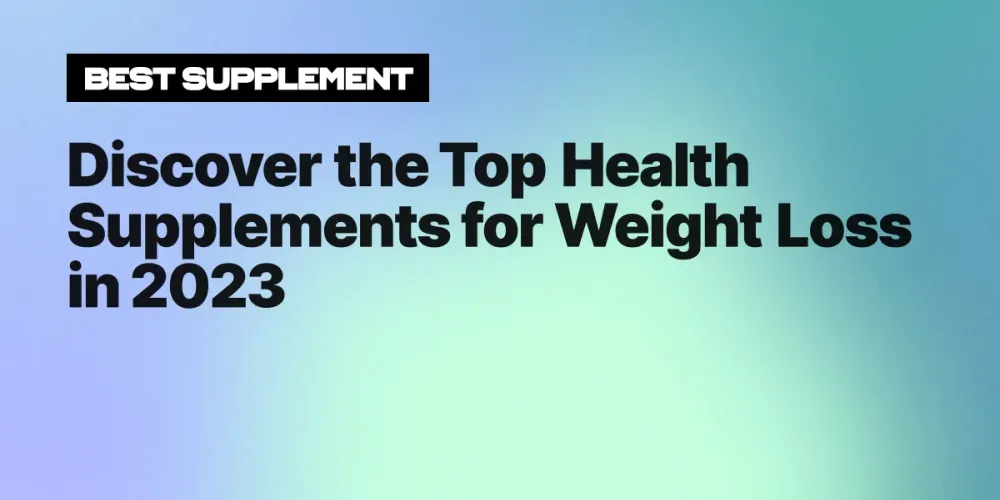Discover the Top Health Supplements for Weight Loss in 2023
- July 12, 2023

Health supplements play a crucial role in supporting weight loss goals and improving overall well-being. In this article, we will explore the relevance and importance of health supplements for weight loss, addressing the challenges individuals face and the need for effective solutions. By understanding the role of weight loss supplements, readers can make informed decisions and take the necessary steps to achieve their desired outcomes.
Weight loss is a common goal for many individuals, and it can be a challenging journey. Factors such as a sedentary lifestyle, poor dietary choices, and genetic predispositions can make it difficult to achieve and maintain weight loss. This is where health supplements come in. They offer a range of benefits and advantages that can enhance weight loss efforts and support overall health.
Key Takeaways
- Health supplements are important for supporting weight loss goals and improving overall well-being.
- They offer benefits such as enhanced metabolism, appetite suppression, increased energy levels, and overall well-being support.
- Scientific research plays a crucial role in determining the efficacy and safety of weight loss supplements.
- The top health supplements for weight loss in 2023 include Chitosan, Chromium Picolinate, Conjugated Linoleic Acid (CLA), Glucomannan, Green Tea Extract, Green Coffee Extract, Guar Gum, Hoodia, 7-Keto-DHEA, Ephedra, and Bitter Orange.
- Each supplement will be discussed in detail, providing usage instructions and potential risks or side effects.
- It is important to consult a healthcare professional before starting any supplement regimen to understand potential risks and side effects.
- Choosing the right health supplements can significantly contribute to a successful weight loss journey.
Understanding Weight Loss Supplements
Weight loss supplements play a significant role in supporting individuals in their weight loss journey. In this section, we will explore the definition and explanation of weight loss supplements, along with their potential benefits and efficacy. Understanding these supplements will enable readers to make informed decisions and choose the ones that align with their weight loss goals.
Weight loss supplements are specially formulated products available in various forms, such as pills, powders, capsules, or liquids. These supplements are designed to be incorporated into a balanced diet to aid in weight loss. They may work through different mechanisms, including improving carbohydrate metabolism, increasing fat-burning or energy expenditure, and reducing feelings of hunger.
It is important to note, however, that the efficacy of weight loss supplements is a matter of debate. While some studies and research have been conducted, the quality of the evidence is often limited or of low quality. The National Institutes of Health’s Office on Dietary Supplements emphasizes the need for additional research to fully understand the safety and efficacy of specific ingredients found in these supplements.
Moreover, it is crucial for individuals to consult with their healthcare professionals before incorporating any weight loss supplements into their routines. Certain supplements may interact with medications or have potential side effects that could pose risks to one’s health. Thus, seeking professional advice is essential to ensure safety and avoid any adverse effects.
Finally, it is worth noting that weight loss supplements are not a magic solution for achieving weight loss goals. They should be seen as a complement to a healthy lifestyle, which includes a balanced diet and regular physical activity. By understanding the role and limitations of weight loss supplements, individuals can make informed choices, set realistic expectations, and pursue a holistic approach to weight loss.
Scientifically Backed Health Supplements
When exploring health supplements for weight loss, it is essential to consider scientific research and evidence. In this section, we will discuss the top health supplements for weight loss in 2023, backed by scientific studies and research. By understanding the efficacy and potential benefits of these supplements, readers can make informed decisions and choose the most suitable options for their weight loss journey.
-
Chitosan: Chitosan is a dietary fiber derived from the shells of crustaceans. Scientific studies suggest that it may help reduce body weight and fat absorption.
-
Chromium Picolinate: Chromium is a mineral that plays a role in controlling blood sugar levels. Some studies suggest that chromium picolinate may help decrease body weight and improve insulin sensitivity.
-
Conjugated Linoleic Acid (CLA): CLA is a fatty acid that can be found in meat and dairy products. Research suggests that CLA may aid in reducing body fat and increasing lean body mass.
-
Glucomannan: Glucomannan is a natural fiber extracted from the roots of the konjac plant. It is known for its ability to promote feelings of fullness and reduce appetite, potentially aiding in weight loss.
-
Green Tea Extract: Green tea extract contains compounds called catechins, which have been associated with increased fat burning and weight loss. Research suggests that green tea extract may also have other health benefits.
-
Green Coffee Extract: Green coffee extract is derived from unroasted coffee beans. It contains chlorogenic acid, which is believed to have weight loss properties and may also help regulate blood sugar levels.
-
Guar Gum: Guar gum is a soluble fiber derived from the guar plant. It can help increase feelings of fullness and reduce calorie intake, potentially contributing to weight loss.
-
Hoodia: Hoodia is a succulent plant native to Africa. Some research suggests that hoodia may help suppress appetite, although further studies are needed to confirm its effectiveness.
-
7-Keto-DHEA: 7-Keto-DHEA is a metabolite of the hormone DHEA. Preliminary studies suggest that it may help increase metabolism and promote weight loss, but more research is needed.
-
Ephedra: Ephedra is a plant extract that contains ephedrine, a stimulant that can suppress appetite. However, it has been banned in many countries due to safety concerns.
-
Bitter Orange: Bitter orange extract contains synephrine, a compound that may have thermogenic properties and promote weight loss. It is important to note that bitter orange can interact with certain medications and may have potential side effects.
It is crucial to follow the recommended usage instructions and be aware of potential risks or side effects associated with these supplements. Consulting a healthcare professional before starting any supplement regimen is highly advisable.
Risks and Side Effects of Supplements
When considering weight loss supplements, it is important to be aware of the potential risks and side effects associated with their use. While supplements offer benefits, it is crucial to understand their limitations and consult healthcare professionals before incorporating them into a regimen. This section will provide valuable insights into the risks and side effects of weight loss supplements, empowering readers to make informed decisions.
-
Possible Interactions: Weight loss supplements may interact with medications, leading to adverse effects or reduced efficacy. It is essential to talk to your doctor or pharmacist about any potential interactions before starting a supplement regimen.
-
Allergic Reactions: Some individuals may experience allergic reactions to certain supplement ingredients. It is important to check the product labels for potential allergens and consult an allergist if you have known allergies.
-
Digestive Issues: Weight loss supplements, especially those containing fibers or stimulants, may cause digestive issues such as bloating, gas, diarrhea, or constipation. It is advisable to start with a lower dosage and gradually increase it while monitoring your body’s response.
-
Cardiovascular Effects: Certain weight loss supplements, particularly those containing stimulants like caffeine or ephedra, may cause an increase in heart rate, blood pressure, or palpitations. Individuals with pre-existing cardiovascular conditions should be cautious and consult their healthcare provider.
-
Liver and Kidney Damage: Some weight loss supplements, particularly those containing high doses of certain ingredients or herbs, may have the potential to cause liver or kidney damage. It is crucial to follow recommended dosages and consult a healthcare professional if you have pre-existing liver or kidney conditions.
-
Mental Health Effects: Stimulant-based weight loss supplements may have an impact on mental health, leading to symptoms such as anxiety, restlessness, irritability, or insomnia. Individuals with a history of mental health conditions should exercise caution and seek medical advice.
-
Lack of Regulation: It is important to note that the regulation of weight loss supplements is not as stringent as that of prescription medications. Quality control and safety standards may vary among different brands. Choose reputable brands and look for third-party testing and certifications.
Remember that weight loss supplements should never replace a healthy, balanced diet, and regular exercise. Prioritize safety and consult healthcare professionals who can provide personalized guidance based on your individual health status, medications, and goals.
Conclusion
In conclusion, discovering the top health supplements for weight loss in 2023 is an essential step for individuals looking to optimize their weight loss journey. By understanding the relevance and importance of health supplements for weight loss, addressing the challenges individuals face, and introducing effective solutions, readers are empowered to take action and achieve their desired outcomes.
Weight loss can be a challenging process, often influenced by various factors such as lifestyle, diet, and genetics. Health supplements offer a promising avenue for individuals looking to enhance their weight loss efforts. They can aid in boosting metabolism, suppressing appetite, increasing energy levels, and supporting overall well-being.
However, it is important to approach weight loss supplements with caution. While some supplements have scientific backing and evidence of efficacy, others may lack substantial research or have limited data from animal laboratory studies. It is crucial to consult healthcare professionals and consider individual health conditions and medications before incorporating any weight loss supplements into a routine.
Additionally, weight loss supplements should never replace a healthy lifestyle consisting of a balanced diet and regular physical activity. They should be seen as a complement to existing efforts, providing additional support and potential benefits. By combining weight loss supplements with sustainable lifestyle changes, individuals can achieve long-term success and create positive habits.
In summary, the journey towards successful weight loss requires a holistic approach that includes informed decision-making, personalized guidance, and a commitment to overall well-being. Understanding the benefits, limitations, and potential risks of weight loss supplements empowers individuals to make educated choices and take the necessary steps to achieve their weight loss goals. Remember, choosing the right health supplements tailored to individual needs is key to effective and sustainable weight loss.
Frequently Asked Questions (FAQs)
- Are weight loss supplements regulated by the FDA?
Weight loss supplements are not regulated in the same way as prescription medications. The FDA does not evaluate these supplements for safety or efficacy before they are marketed. It is important to research and choose reputable brands that follow quality manufacturing practices.
- How effective are weight loss supplements?
The efficacy of weight loss supplements varies, and it is essential to approach them with caution. While some supplements have scientific evidence supporting their effectiveness, others may have limited research or mixed reviews. It is important to consult with healthcare professionals and consider individual health conditions before starting any supplement regimen.
- What are the potential risks and side effects of weight loss supplements?
Weight loss supplements may have potential risks and side effects. These can include digestive issues, cardiovascular effects, allergic reactions, and interactions with medications. It is crucial to follow recommended dosages, review product labels for allergens, and consult with healthcare professionals to avoid any adverse effects.
- Do weight loss supplements replace a healthy diet and exercise?
Weight loss supplements should never replace a healthy lifestyle that includes a balanced diet and regular physical activity. They should be seen as a complement to existing efforts, providing additional support and potential benefits. Sustainable weight loss requires a holistic approach that includes lifestyle changes.
- How can I choose the right weight loss supplement for me?
Choosing the right weight loss supplement depends on individual needs and health conditions. It is important to consult with healthcare professionals who can provide personalized guidance based on medications, allergies, and specific weight loss goals. Additionally, choosing reputable brands and reviewing customer reviews can help in making an informed decision.


